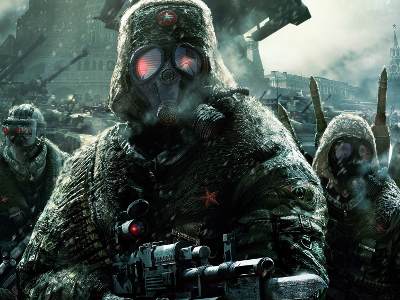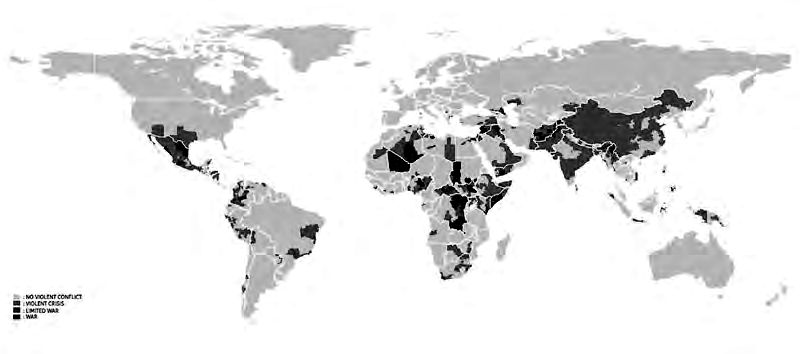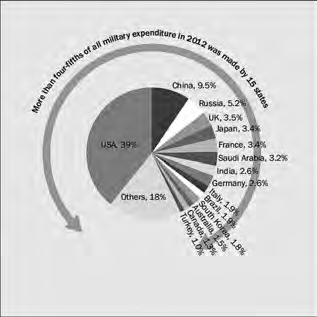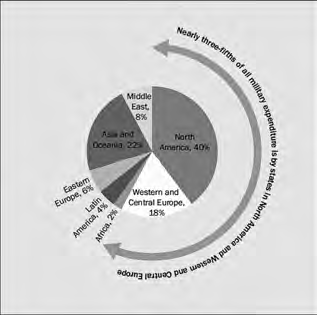War and Capitalism
The hypocrisy of the debate on military spending

Barometer, the annual publication of the Heidelberg Institute for International Conflict Research, for 2012 records 396 being nailed in the entire planet, nine more than in 2011 - it should be stressed that according to the methodology used for the classification, within of a country or between different countries may be more nailed at the same time, depending on the actors (states, groups, factions) involved. 188 are classified as "nailed non-violent" (105 disputes and crises 83), 43 "highly violent wars" and 165 "violent crises", for a total of 208 armed conflicts, the highest number ever recorded by the institute from 1945 the main theaters are the sub-Saharan Africa (19 wars and violent nailed 37), the area of Asia and Oceania (10 wars and nailed 55), the Middle-riente and the area of the Maghreb (9 wars and nailed 36). Angola, Chad, Congo, Ethiopia, Niger, Sudan, Afghanistan, Iraq, Libya, Syria wars more known to the public, but nothing makes the idea of the location of nailed the overall look that can provide a map (see Figure 1).
The SIPRI report, 2013 (Stockholm International Peace Research Institute), for the year 2012 and published in April last year, a complaint global military expenditure of 1,753 billion dollars, accounting for 2.5% of world GDP. The count includes purchases of armaments, personnel expenses civilian, military and paramilitary, research expenses, expenses for missions, including those defined in peacekeeping, and the cost in various capacities in the financial statements of the Ministries of Defense of different States.
Figura 1. Fonte: Conflict Barometer 2012, Heidelberg Institute for International Conflict Research

Enormity of the figure apart, are two relevant aspects: only 15 countries have spent, in total, 82% of world spending (see Figure 2); 58% of world spending ever, was carried out by the Member of the North America (40%) and Western Europe (18%), ie from countries belonging to that area where there are no armed conflicts in progress (see figure 3). Since 2001, the Report points out, the year of initiation of the "global war on terror", to date, the United States has increased its military spending by 69% to spend in 2012, $ 682 billion; However, the economic crisis is starting to weigh on the U.S. defense budget, which shows a decrease of 8% compared to the peak of 2010 In Western Europe the peak of spending occurred in 2009 (+ 9% compared 2001), and then a sharp downward trend, which is also due to the spending review of the various public accounts, which led to an overall reduction of 1.5% in the period 2001-2012.

Figure 2 Source: SIPRI, 2013, Quote of world military expenditure in 2012 of the 15 states with the highest expenditure


Figure 2 Source: SIPRI, 2013, Quote of world military expenditure in 2012 of the 15 states with the highest expenditure

Figure 3 Source: SIPRI, 2013, Regional Units of world military spending in 2012
In 2012, the UN has managed 29 international missions, 14 of them in sub-Saharan Africa and the Middle East between 8 and Ma-ghreb; the European Union has operated 14, including Europe, the Middle East, Asia and sub-Saharan Africa; NATO is in Afghanistan now for twelve years, then in Kosovo, in Somalia, in the Mediterranean Sea, in the sea in the Horn of Africa and in the Gulf of Aden, and since last December with the end-Turkey-Syria; in 2011 led to the conflict in Libya and fled Iraq since the war began in 2003.
The economic downturn and welfare cuts have drawn the attention, even in Italy, on military spending; the story of the hunt F35 - 13 billion euro spending estimated only for the purchase, excluding the subsequent maintenance - and the cases of alleged international corruption have raised the 'level' of the news, and now the public is clamoring for the reduction of fees for the defense, according to data of the same ministry (1) amounted to EUR 20 billion in 2012 and will grow further in the coming years (20.9 billion in 2013, 20.5 expected in 2014, 21 in 2015 ).
Before the current crisis have been the war in Afghanistan in 2001 and Iraq in 2003 to bring into the public debate the thorny issue of the war - previously, the bombing of the former Yugoslavia in 1999, authorized by the government led by Massimo D'Alema, not had much heated tempers. Italians have discovered pacifists, the balconies were filled with fluttering flags of peace and Article 11 of the Constitution that "repudiates war as a means of settling international disputes" is imprinted in the minds of citizens. Unnecessarily, because Italy has always participated in the UN and NATO missions launched from 2001 onwards.
However, the debate on pacifism, first, that the mere economic issue due to the crisis, then, are at the bottom of hypocrisy, which calls into question the political thinking of the left, who, wrapping themselves in the rainbow flag from Bertinotti on , has eluded a fundamental question that answers the question: why the advanced capitalist countries go to war theaters in sub-Saharan Africa, Asia, the Middle East and the Maghreb? To ensure the direct control of key raw materials, especially oil and gas, but not only is the answer to a growing share of citizens who in recent years has been vaccinated, fortunately, against the propaganda of '"export of democracy" and the "global war on terrorism." Yeah, but what does this mean?
In 1902, the economist John Atkinson Hobson, of liberal ideas and progressive, not a Marxist, he published saggioImperialismo - A Study. The three previous decades were characterized by political and economic phenomenon that definitoimperialismo, which led to the division of the world at the hands of European nations and the United States, with the creation of colonial empires. When that phase of history ended with the outbreak of World War I, no longer existed on the planet 'no man's land', ie territories that did not belong to a nation. Analyzing the birth and development of the phenomenon, and inserting it in the context of economic, Hobson argued that imperialism is in the very nature of capitalism: "American imperialism was the natural product of the economic pressure of a sudden advancement of capitalism that could not find utilization within and that he needed foreign markets for trade and investment, "wrote the economist; "The same needs exist in European countries, and, as he admits, urged governments on the same street. Overproduction in the sense of a manufacturing plant is too large, and surplus capital that could not find solid investments within the country, have forced Britain, Germany, Holland, France to place ever-increasing share of their income outside the area of their present political domination, and thus to stimulate a policy of expansion in order to integrate new areas. "
In 1916 Lenin takes up the topic, expanding it and inserting it in the key of reading Marx, and writes the famous saggioL'imperialismo - the Highest Stage of Capitalism. Tracing a historical and economic - full of facts and figures - Lenin shows the steps by which the capitalist system has generated, by its ontological nature, imperialism. From the initial phase of free competition has gone to monopolistic - understood as trusts, cartels, few large industries - born thanks to the accumulation of capital generated by profits, which allowed the 'combination' of business - the acquisition of all stages of production, from raw materials to finished products - and their concentration - a merger of companies between them. At this stage he was born, next to the industrial capital, financial capital that banks change their function from being mere intermediaries and payments become places of gathering money in annuities that provide the capitalists, through loans. Working capital is transformed into inactive and active capital produces huge profits flows. Banks and grow in this area also triggers the logic of concentration, through the merger of several institutions and mechanism of the equity. Birth of the financial monopoly: few banks, united in trust, control the credit market in an industry which is also based on monopolies. It follows a relationship of strong mutual dependence, which triggers the entry of banks into the industrial capital through the purchase of shares and the presence of bankers on the boards, and the boards of industrial banks. "The six largest banks in Berlin were represented by their directors in 344 industrial companies, and through the members of their boards of directors in the other 407, ie around 751 companies. [...] In turn, the boards of directors of those six banks were sitting (in 1910), fifty-one big industrialists. "After the oligarchy Manufacturing, founded the fi-nancial oligarchy. "Finance capital, concentrated in a few hands and enjoying a de facto monopoly, derives income gigantic and growing foundation of every society, the issue of shares, from government loans and so on. and consolidates the hegemony of the oligarchy fnanziarie. "
It is the passage from the old capitalism that Lenin defines the new capitalism, from the domain of industrial capital to the domination of finance capital, and identifying occurred in the early twentieth century. If the old capitalism exported goods, the new capital exports, dragging with it the export of goods: more and more frequently, in fact, the loans granted by the advanced capitalist countries to the south of the site is conditional on the undertaking that part the borrowed money is used to purchase goods produced in the State granting the loan. Lenin cites as an example a report of the Austro-Hungarian consul in Sao Paolo, Brazil, which reads: "The construction of railways Brazilian capital is accomplished primarily with French, Belgian, British and German; these countries, in the fi-nance railways, pose as a condition of the supply of railway equipment. "Come the international monopolies.
In the electrical industry, for example. Since 1900 the German AEG starts mergers and acquisitions of other electricity companies, to find himself in 1912 to dominate almost 200 companies, with the system of holdings, to count 34 representations abroad - including 12 joint-stock companies in 10 states including an Italian, AEG Thomson-Houston company Italian Electricity SA - and to be characterized by the activity 'combined', incorporating the company's production of fi-nite such as cables and insulators until you get to automobiles and airplanes; industrial growth is impossible if there had been a few large banks in the financial y-. Otherwise go for the American General Electric - the corporation still exists - that is born in 1892 from the merger of Edison General Electric Company, Thomson-Houston Company and other companies, immediately becoming dominant on the market; also expanded its production to include industrial products of various kinds, such as transport systems, the first electric fans, heating devices and cooking.
In the oil sector in 1905 is dominated by two monopolies, including the fathers of today's multinational companies: Standard Oil and the Rockefeller-Rothschild alliance Nobel, the latter characterized by what we would call today a joint venture: the brothers Swedish extracted the Russian oil the area of Baku, in the Baltic Sea, the Jewish family of wealthy bankers financed the construction of the railway line to the ports of the Black Sea, to allow the export of crude oil even in the harsh winter months.
The AEG and General Electric, Standard Oil and the Nobel-Rothschild, had literally scores the respective global markets, creating a cartel and defending its regime of very small oligopoly by potential new competitors.
Therefore, it is the financial capital, says Lenin, to push states to advanced capitalism to an imperialist policy, "Finance capital is a power so remarkable, in fact you can say so decisive in all the international and economic relations, to be able to submit even countries in possession of full political independence, as did subjects them [...]. But of course it is the most 'comfort' and higher profits when this subject is accompanied by the loss of political independence by countries and oppressed peoples "; especially in the field of raw materials. "The key feature of modern capitalism is constituted by the monopolistic domination of the leagues of the great entrepreneurs. These monopolies are especially strong when all sources of raw materials go in the same hands. [...] Only the colonial possession ensures a monopoly, in absolute terms, the success against every eventuality in the fight with the enemy [the new entrant that can steal market share monopoly, nda], even against the possibility that the adversary Trinceri is behind some law of the state monopoly. The more capitalism is developed, the more the scarcity of raw materials is sensitive, the more acute worldwide competition and the hunt for sources of raw materials, the more desperate is the struggle for the conquest of the colonies. "
As for Lenin's analysis, which is based on the thought of Marx, has hit the mark, it is obvious. This is surprising only those who rifuta Marx a priori, assimilating the name of the thinker of Trier to 'communism' Russian or Chinese and not to its critical examination of the mechanisms that govern the capitalist economic system. No, moreover, reflect on the fact that when one recognizes that the United States and European countries have conquered Iraq and Libya to appropriate the rich deposits of oil, and Afghanistan to control the territory through which they had to unavoidable geographical reasons, pipelines and gas pipelines that pass from Kazakhstan and Turkmenistan, under the control of the American oil companies, they had to bring the black gold on the shores of the Indian Ocean Pakistan (2), there is nothing but confirm the validity still, the Marxian analysis.
Libya had nationalized oil and gas in 1970, suffered an economic embargo Use from 1981 to 2006, with the addition of the entry in the list of 'rogue states', and a UN embargo from 1992 to 1999; although since 2006 he opened the doors to foreign capital and started to export oil, Gaddafi remained a 'crazy horse' difficult to manage. Iraq had nationalized its oil in 1972 and following the first Gulf War was subjected, since 1992, in a strict economic embargo. Afghanistan after the withdrawal of the Russian army in February 1989, it was a total political chaos, divided territorially between the Taliban and the Northern Alliance mujahideen.
It was therefore impossible for the American and European capital control sources of raw materials and their supply - industry that brings with it the entire productive economy of a state - without direct control over the territory of the three countries. The same applies to the areas of sub-Saharan Africa, the Middle East and the Maghreb countries characterized by weak prey of continuous civil wars for control of power - in this case economic, ethnic and religious issues are only the red cloth to wave in front of the bull-people who end up, inevitably, always defeated in a bloody fratricidal - in which political stability is a chimera; and the capital needs stability, especially in the raw materials sector, where before producing profits must make large investments for extraction.
It seems clear that the neo-imperialism - exploded after the end of the Cold War, which had crystallized the geopolitical world, dividing the world into two blocs - has little different than the 'old' imperialism analyzed by Lenin. Including the aspect that sees the financial capital drag the industrial capital of the advanced capitalist countries: the vast majority of loans allocated by the World Bank to Iraq and Afghanistan for the reconstruction of the two countries - for example, the last credit given to Iraq, granted December 18 last year, amounted to $ 900 million - goes into the pockets of big corporations, monopolies cleanse them, and Western companies through international tenders. And there is even the more traditional dynamic linked to imperialism, which had already shown Hobson, namely the need for an industrial capital in overproduction of new markets for trade and investment: as exemplified by the example of Coca Cola, returned in Iraq in 2005 with factories and distribution, after 25 years of a ban signed by Saddam Hussein, and in Afghanistan in 2006, after the Taliban had driven out in 1996.
War, colonial policy and imperialism existed even before capitalism, this is not the point; the fact is that they have always been linked to the production system of its historical period. Need of slaves, land for a growing population, primary resources - water, land. However, today the hypocrisy reached its zenith. Because if it is obvious that the political thought of the right, an expression of the Capital, the economic reasons of the war hiding behind the 'ideals' of the existence of heaven, as Marx called it - on the other hand does not even recognize that the source of the profits of capital industrial, which everything is born, it is the labor force, and therefore the exploitation of man - from left-wing thought is unacceptable a critical position against the wars and military spending that it denounces capitalism also, that the economic system, just this historical phase, which ontologically produces them, and that can not be ontologically or 'reformed' or made 'ethical'. But you know, Marx is finished oblivion.
(1) See. Notes to the Ministry of Defence to design Budget Law for the year 2013 and for the period 2013-2015.
(2) Except then fail in the first two companies, Iraq and Afghanistan: cfr. F. Damen, Iraq and Afghanistan: analysis of a bankruptcy, Paginauno n. 9/2008, F. Damen, Iraq: the oil boom and the defeat of the American Oil Company.
Source : http://www.usiait.it/component/content/article/1590-guerra-e-capitalismo-lipocrisia-del-dibattito-sulle-spese-militari.html

Nessun commento:
Posta un commento